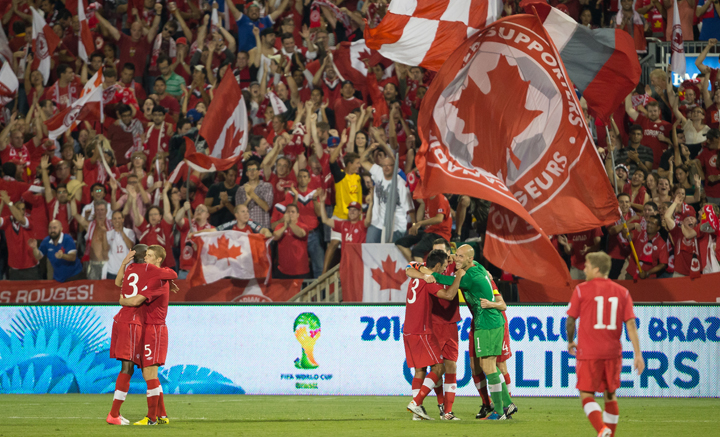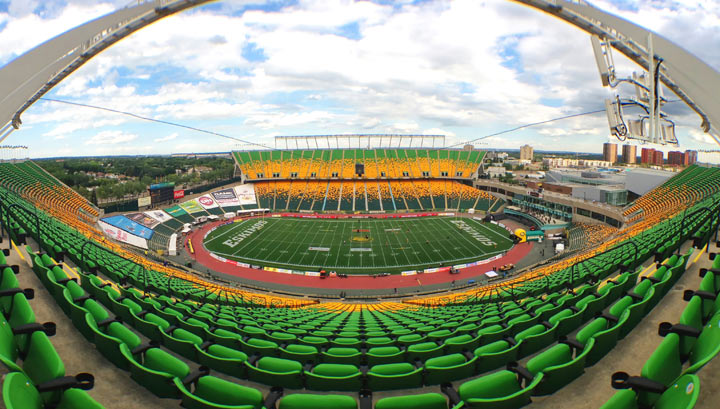TORONTO – Though Brazilians are likely still reeling from their defeat on the soccer field, the country was praised for giving the world a “smoothly run, exuberant sporting spectacle”—a spectacle the Canadian Soccer Association (CSA) has its eye on for World Cup 2026.

A spokesman for Canada’s Minister of State for Sport Bal Gosal said discussions are in the “very early stages” with the CSA, the organization that would be responsible for the bid.
“In accordance with the Federal Policy for Hosting International Sport Events, any decision on potential support for bids will be subject to due diligence by federal government officials,” wrote spokesperson Robert Lynch in an email to Global News.
So would Canada get support from the government and the public, or face the same criticism that plagued Brazil over delayed stadiums and spending? Here’s a look at challenges our country would have to address to host the big event.
Enough stadium space?
Sport marketing instructor at York University’s Schulich School of Business Vijay Setlur said fan support and volunteerism won’t be an issue, but whether the country has enough facilities needed to stage an event of World Cup calibre will be the main challenge.
Setlur said most large stadia in Canada are used by Canadian Football League (CFL) teams, and would need some kind of renovation to increase capacity and/or amenities. But the former soccer journalist said the timing is good because of the new facilities opening and various renovations already underway across many Canadian cities.
“The stadia renaissance comes at an interesting time because with the CSA preparing to submit its bid for the World Cup by 2016, they’ll be able to highlight not only the completed stadia, but also the ones that are in the pipeline,” Setlur told Global News.
“So it may not take as much to renovate them or bring them up to FIFA standards given this renaissance, whereas if this renaissance wasn’t in effect, then there’d be a long way to go to get these stadiums up and ready.”
Setlur suggested there’s a chance we won’t need to build any facilities from scratch, except potentially a “main stadium” for the opening match and championship final, which FIFA requires to seat 80,000 people.
Canada’s current largest stadium is Montreal’s Olympic Stadium which seats more than 65,000; Setlur said additional seating there would be a possibility.
“We’re further along in terms of preparedness right now—even before submitting a bid—than the last two countries that have bid for and won the right to host the event.”
Coordinating with the CFL
When it comes to the potential use of CFL stadiums, the timing would overlap with its summer season. But Setlur suggests Canada could avoid conflicts by sticking to FIFA’s minimum requirement of eight stadiums, and notes venues such as Montreal’s Olympic Stadium which is only used for the Alouettes’ playoff games.
Coordination with the CFL has gone well so far for the FIFA U-20 Women’s World Cup taking place in Toronto, Moncton, Montreal and Edmonton this August, according to FIFA Women’s World Cup Canada Organising Committee CEO Peter Montopoli.
Montopoli, who is also the Canadian Soccer Association’s general secretary, said the FIFA Women’s World Cup Canada 2015 planning committee worked with the CFL commissioner and teams to make sure they took the CFL’s needs into consideration, and worked around the league’s schedule.
He said for a potential 2026 Men’s World Cup bid, it would be critical to have the CFL on board, though “not all eight to ten stadiums would be CFL.”
“But more importantly, I think one would have to take a look at it and see that any enhancements done to the stadiums, the CFL benefits from at no cost. … If they want to enhance their stadium infrastructure, what better way than to have a major international competition come to your venue?”
Improvement of the Canadian men’s team
The state of the men’s national team is an “issue,” said Setlur, who believes events in the next few years will give Canada’s men’s team “ample opportunity” to improve its current 110th world ranking. Though the host team would automatically get to play, Setlur said that’s not necessarily a good thing.
He added that there may be an international perception that Canada is “bizarre” since our women’s team is more successful than our men’s team.
Setlur added many believe it’s the success of a country’s men’s program that should dictate whether it deserves to host the men’s World Cup.
But the Canadian Soccer Association is proud of the status of women’s soccer.
“Knowing the excitement of the country after we won a bronze medal in the Olympics, and now the next event of FIFA—after completing 64 matches in Brazil—is coming to Canada, and we look forward to hosting the world,” said Montopoli.
The CSA said it has currently sold more than 40 per cent of what it would expect for the FIFA U-20 Women’s World Cup this summer at 130,000 tickets.
For FIFA Women’s World Cup 2015, it would need 1.5 million spectators (spread over venues in Vancouver, Edmonton, Winnipeg, Montreal, Ottawa and Moncton) to set a new FIFA attendance record—which would be larger than the 2010 Vancouver Olympics.




Comments